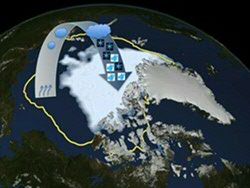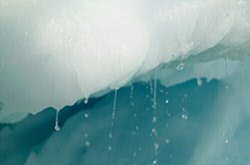Strong warming leads to increases in Arctic rainfall
The Arctic is known for its deep-freeze temperatures, especially in winter when temperatures can drop to -40 °C or lower. However, the Arctic is currently warming fast, about three times as fast as the global warming rate. Three years ago, researchers from KNMI concluded that Arctic warming and sea ice retreat will lead to enhanced precipitation, but the assumption then was that this would fall predominantly as snow owing to the low ambient Arctic temperatures.
Richard Bintanja, who works at the KNMI and since the 1st of March 2017 affiliated as honorary professor with the Energy and Sustainability Research Institute, ESRIG, at the University of Groningen and Olivier Andry have now determined that the additional precipitation will almost exclusively fall in the form of rain. In their Nature Climate Change article of 13 March 2017 “Towards a rain-dominated Arctic” they show that this feature is linked to the strong warming of the Arctic region, so that precipitation (which begins as snow) melts in the warm atmosphere and reaches the surface as rain.
Moreover, they show that Arctic precipitation, which currently is dominated by snowfall, will predominantly consist of rain near the end of the century. This will have far-reaching consequences, for instance with respect to melting of snow, glaciers, sea ice and permafrost (promoting the release of methane, a potentially strong greenhouse gas), for all kinds of ecosystems that depend on (seasonal) availability of fresh water, but also for humans by increasing sleet and the associated infrastructural problems.
For more information you can contact Richard Bintanja:
e-mail: bintanja gmail.com
telephone: +31 637565005


| Last modified: | 22 January 2018 2.48 p.m. |
More news
-
24 March 2025
UG 28th in World's Most International Universities 2025 rankings
The University of Groningen has been ranked 28th in the World's Most International Universities 2025 by Times Higher Education. With this, the UG leaves behind institutions such as MIT and Harvard. The 28th place marks an increase of five places: in...
-
05 March 2025
Women in Science
The UG celebrates International Women’s Day with a special photo series: Women in Science.
-
16 December 2024
Jouke de Vries: ‘The University will have to be flexible’
2024 was a festive year for the University of Groningen. In this podcast, Jouke de Vries, the chair of the Executive Board, looks back.
